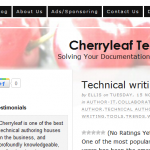Some Thoughts on Technical Writing in the Cloud
 Cherryleaf has an informative article about technical writing in the cloud. Ellis Pratt writes,
Cherryleaf has an informative article about technical writing in the cloud. Ellis Pratt writes,
There are a number of reasons why a Technical Author might want to use a cloud-based application. The first reason is cost. Instead of purchasing an application, cloud-based applications are typically offered on a monthly fee basis. If you're looking to move to a DITA authoring environment, this spreading of costs could prove an attractive alternative to the upfront costs associated with buying a DITA solution. (See Technical writing in the Cloud.)
Cherryleaf lists some other compelling reasons for moving to the cloud as well: it allows new authors to get integrated quickly, it facilitates collaborative authoring, and allows for third-party groups to log in and make minor edits.
I agree that technical writing in the cloud has major appeal. Some help authoring solutions that you install yourself require extensive implementation. It may seem like a cost savings to install and run the software yourself, but if you have to hire an expert to come on-site and install the system, and then periodically maintain it, that expense can add up.
I know that WordPress has offered a choice between the cloud or a local install. WordPress.com is a cloud-based host; in contrast, WordPress.org allows you to download the same software and install it on your own server.
The cloud solution allows you to focus on the content rather than getting wrapped up in technical problems. There's a strong appeal in that. However, the WordPress.com solution places various limitations on what you can and can't do. That restriction can often be a dealbreaker. For example, WordPress.com prohibits ads and restricts you to about 150 pre-selected themes. But mostly you have the same potential to write and publish content.
With technical writing, I'd like to see help authoring companies move towards similar models: offer a freely hosted solution in the cloud, but also offer a self-installation solution. Let users choose.
Now here's the problem. Most help authoring companies charge per license and will place the entry bar at a high financial level. For example, when we looked at easyDITA, the hosted solution cost something like 60k a year. The incentive for the cloud isn't that strong because help authoring tool vendors don't have any other revenue model besides the fee assessed on the customer.
But what if the cloud model could function more like Gmail or Wordpress.com, offering free or inexpensive solutions? The company could earn money from side benefits such as advertising and add-ons. Even if each webpage had the vendor's company logo in the footer, that might be tolerable. After all, every Youtube video imprints itself on videos users upload. It's the price for using their service. Instead of despising this third-party branding, most people have become immune to it. Actually, during a previous usability research session here, when a user saw the Youtube logo on a video tutorial for our software, she immediately said, "Cool!"
The company that makes this cloud model work might be a major player in the help authoring space.
About Tom Johnson

I'm an API technical writer based in the Seattle area. On this blog, I write about topics related to technical writing and communication — such as software documentation, API documentation, AI, information architecture, content strategy, writing processes, plain language, tech comm careers, and more. Check out my API documentation course if you're looking for more info about documenting APIs. Or see my posts on AI and AI course section for more on the latest in AI and tech comm.
If you're a technical writer and want to keep on top of the latest trends in the tech comm, be sure to subscribe to email updates below. You can also learn more about me or contact me. Finally, note that the opinions I express on my blog are my own points of view, not that of my employer.
